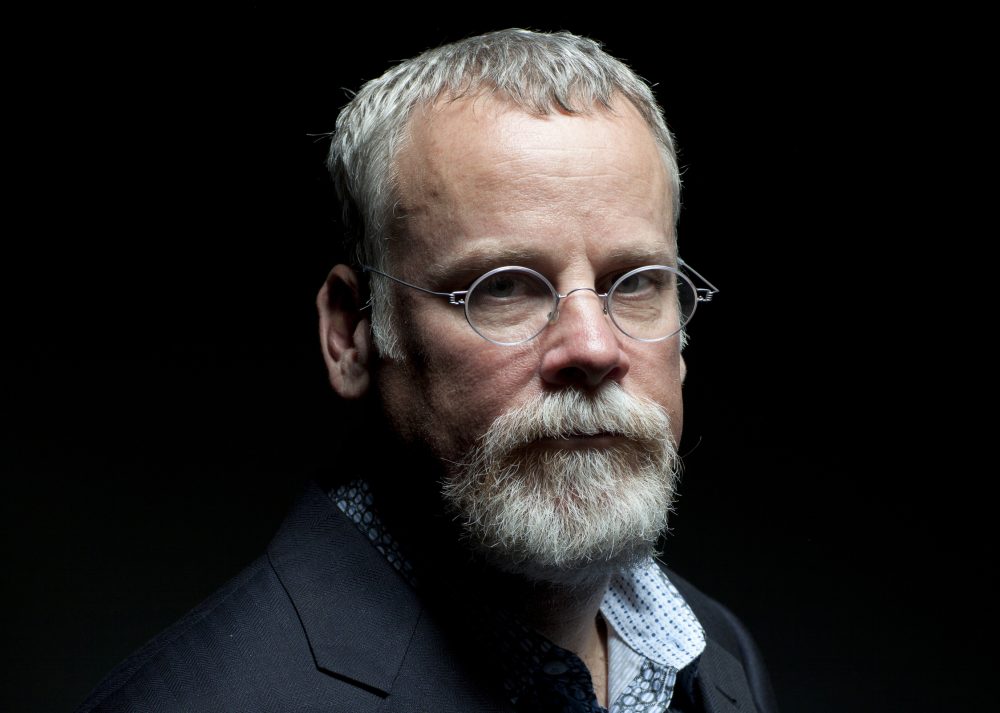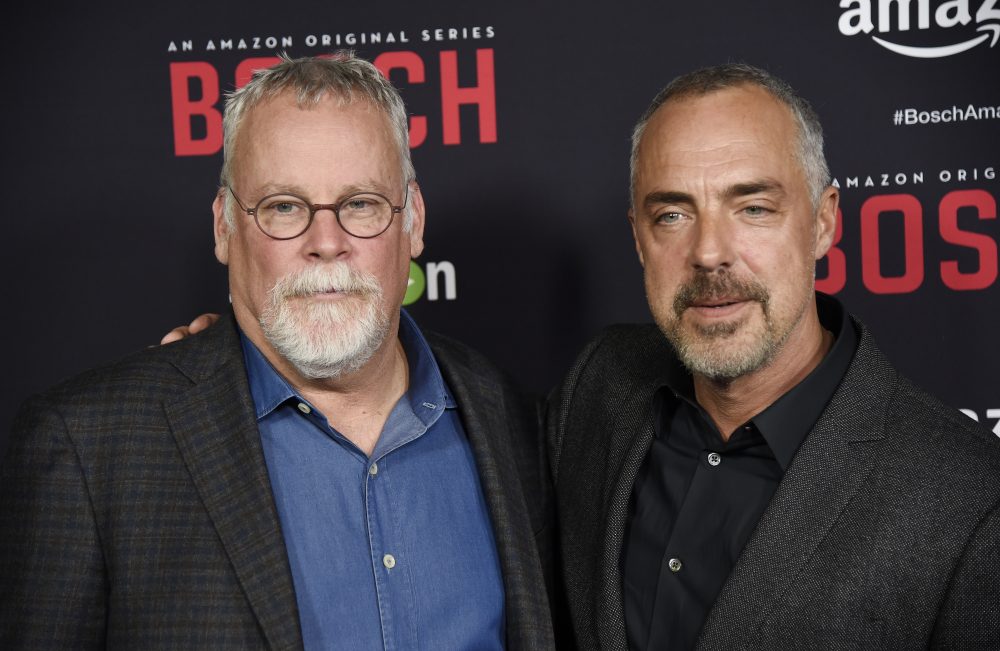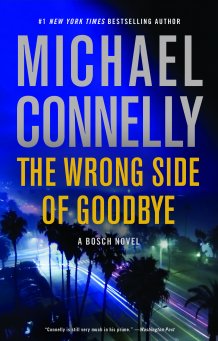Advertisement
Best-Selling Author Michael Connelly Has Learned How To Bring 'Bosch' To Life On Page And On Screen

Writing novels is, almost by definition, an act that’s executed in isolation.
"For 25 years," says best-selling author Michael Connelly, "I have had that solitary me-against-the-computer thing."
He still does, of course. Connelly has written 29 novels, including his latest, "The Wrong Side of Goodbye," the 19th to focus on iconic Los Angeles-based detective Harry Bosch. It’s currently No. 8 on the New York Times best-selling hardcover fiction list.
"For 25 years, I have had that solitary me-against-the-computer thing."
Michael Connelly
He started work on a new book the first of December. But Connelly has another gig, too. He’s a co-creator and one of six main writers on the hit Amazon Prime TV series, “Bosch,” featuring the same detective, albeit about 15 years younger than he is in the current novel, as played by Titus Welliver. The first two seasons of “Bosch” are streaming, production is about 80 percent done on the third season, and the series was just given the green light for a fourth.
It’s a taut, gripping series, hewing close to the tenor of the books, right down to the jazz soundtrack by Frank Morgan, Art Pepper, Grace Kelly and others that Bosch so favors. The main difference, Connelly says on the phone from his Los Angeles home, “is the books are [written] purely through Bosch’s point of view and the show can’t be made that way. We have to have the point of view of [Bosch’s partner] Jerry Edgar, the deputy chief [and others] so there’s all kinds of stuff to create and it’s fun. I think it would be actually boring to retell these stories exactly as they’re detailed in the book. I like the reinvention.”
Throughout the '90s, Connelly’s fans were baffled that none of his books, so vivid and compelling, had made it onto the big screen. All had been optioned by the studios and Connelly says that early — and substantial — influx of money allowed him to give up his job as a police reporter with the Los Angeles Times and focus on novels.
The movie situation changed in 2002 when Clint Eastwood directed and starred in “Blood Work,” playing a retired homicide detective named Terry McCaleb.
Then in 2011, Matthew McConaughey starred in “The Lincoln Lawyer,” the first of five Connelly novels featuring Bosch’s half-brother, Mickey Haller. (Bosch and Haller have jointly appeared in seven books.)
With these two compelling characters, Connelly has developed a strong brand.
“I think these guys, they’re high-stakes guys and I think all of us hope to be able to step up when stakes are high and the chips are down,” Connelly says. “How are we going to act and respond? There’s a lot of that in these stories.”
Advertisement
Connelly had different reactions watching actors portray characters he had created. “When I write about Mickey Haller as the Lincoln lawyer I totally see Matthew McConaughey,” Connelly says, “because he took that character when that character was still fairly new to me -- only two or three years old — when I knew McConaughey was going to play him. He’s also the same age, the right age, in comparison to the book.”
The actor who plays Bosch, Welliver, is 55, near Bosch’s presumed age in the TV series. “I was the one who brought his name to the production,” Connelly says. “I saw this guy as a guest star in a TV show called ‘Touch’ and it was something about the torment and baggage that he’s carrying. You can see it in his eyes. I threw his name out and we looked at many different people but he came in and won the job.”

"Titus is fantastic as Harry Bosch,” Connelly says, “but the guy I’ve been writing about since 1990 is too solidly in my head."
In 2014, with “Bosch,” Connelly shifted from a being solo operation as a novelist to being part of a group effort on TV. "It’s a change and it’s actually a lot of fun. Our team of writers comes from some of the great shows — ‘Breaking Bad,’ ‘Mad Men’ and so forth — and it’s an extremely intelligent group. It’s a boardroom style thing where we’ll go around and debate."
Connelly says he doesn’t consider himself top dog in the writers group. He says he’s more "the watchdog of Harry Bosch’s integrity. But I gotta tell you: I think in three seasons, I’ve probably said the words ‘Harry Bosch wouldn’t do that or wouldn’t say that’ no more than five times. These people know what Harry Bosch would do."
Each of the first two seasons combined elements of three Bosch novels; the third will mesh two, "The Black Echo" and "A Darkness More Than Night."
“It’s really about winding stories together,” says Connelly. "Different arcs, how we balance an episode, characters and all that. I didn’t make a deal with Amazon for one book. Amazon has all these books and so from Day One we always [said] to the writers: ‘Take what you need. If you find something in this book — a character explanation or exposition — use it if you find the right spot.’ I’m going to keep writing the books. I don’t think we’re ever going to run out of material."
Every season, the "Bosch" process begins in March. Connelly brings what he calls "the bible" to the table — "about a 60 page summary of what we should do during the season. The writers get together and we beat out the 10 episodes. We don’t even start filming until the end of July. It’s a small group and then it becomes a major city of 150 people because we’re talking about all these actors and crew. But that’s not where my expertise is — standing around and nodding and saying, ‘That looks good’ or whatever. It’s the March through July part where I’m very much involved."
And sometimes work on "Bosch" crosses over into writing the Bosch books.

In mid-2015, Connelly was writing the “The Wrong Side of Goodbye,” developing a story about Bosch, now a private detective, searching for an heir to the fortune of an aging, ultra-secretive aviation industry billionaire named Whitney Vance -- shades of Howard Hughes. Vance is on his deathbed and determined to find his next of kin, namely a half-Hispanic child he may have sired out of wedlock when he was a young man.
"The traditional private eye story was what I was writing," Connelly says. "But as I was writing it I thought it was going to be a short book. I don’t like padding my stories. I’m very reportorial in that, so I just figured I like what I’m doing here, but it looked like a 250-280 page type thing. I was struggling and thought, ‘Maybe I can find another story.’ "
At the time, Connelly was on the set of the TV series and out of that happy coincidence the second plot line evolved. They were filming a shootout scene in a parking lot plaza outside a bank in San Fernando. Connelly got to talking to one of the off-duty local cops who’d been hired to do security. The cop, an avid fan of the Bosch books, noted that in the novels Harry, who was then 65, had retired from the LAPD and was working as a private investigator.
He said that if ever Harry wanted to return to active duty and work murders — and have it reality-based — San Fernando had a program that utilized unpaid reserve detectives. The town had a tiny department and a low tax base. The cop set up a meeting with Connelly and the police chief … and out of that came Harry Bosch’s new, second job.
Bosch ends up spearheading a task force in pursuit of a stealthy, serial rapist dubbed the “Screen Cutter” for his method of entry into victims’ apartments. Bosch shifts between the two cases in what Connelly calls a “double helix plot.”
Connelly’s task as a writer of crime thrillers is to keep readers in suspense but wrap up the major threads by the end. “I mean it’s my duty to tie up the big stuff,” he says, “and if I didn’t it would be an unfulfillment of the reading process. At the same time, I come from journalism and I know that the LAPD has less than a 75 percent clearance rate of murders. People get away with murders; that’s the way it is. Everything is not always tied up in life, so I leave some things unanswered and open. That works within the book and also if I want to come back to that in a later book.”
Bosch has a simple credo, both in books and the TV series, when he approaches a murder: Everybody counts or nobody counts.
"No one ever said that to me," Connelly says, when asked if it was borrowed from a real-life detective. "But as a reporter, I knew a lot of detectives. When I was starting out, the ones I gravitated to were the ones that took the cases personally, the ones I thought were the better detectives. There was a baseline of fairness. It could be a one paragraph murder in the LA Times or it could be a big takeout in the LA Times, they gave it the same effort, and that’s where I came from."
Connelly says that philosophy is even more important now than when Bosch first said it, adding, "It extends beyond the philosophy of homicide to the institution of life. It’s about being fair. It’s about Black Lives Matter. Yes, they matter. Everybody counts or nobody counts and I think if more cops had the philosophy of Harry Bosch we’d have less of these situations happening. I do think about how Harry Bosch does have a philosophy that may be useful in our world today."
When Connelly publishes his next novel in the fall of 2017, we’ll be reading about a new crime fighter: A detective in the LAPD, based on cold case specialist Detective Mitzi Roberts, who has consulted with Connelly on the books and TV series. (She also played a detective, named after her, on one episode of the first season of “Bosch.”)
"It’s going to be a challenge because it’s a female protagonist," Connelly says. "For the last month I’ve been noodling around and working on it."
So, Bosch and Haller will go on hiatus. "You want to give them a rest so those batteries recharge," Connelly says. "It’s always helpful because when I’ve been away from these characters for a year or two, I can’t wait to start writing about them again. But on the other hand, on the creative, artistic level, I turned 60 this year. I don’t want to just keep writing and alternating between two characters that I’ve had around 25 years. I want to create new things and I think this is the right time to do that."

